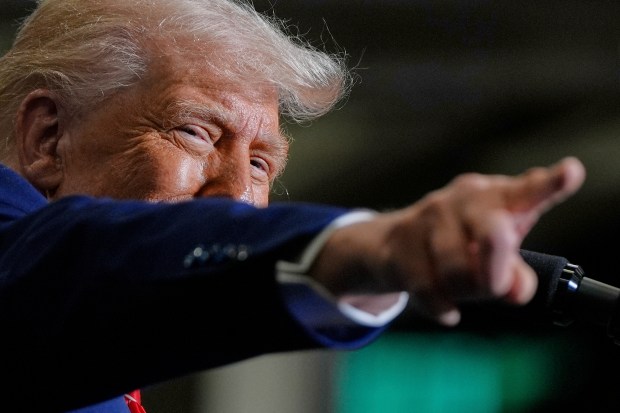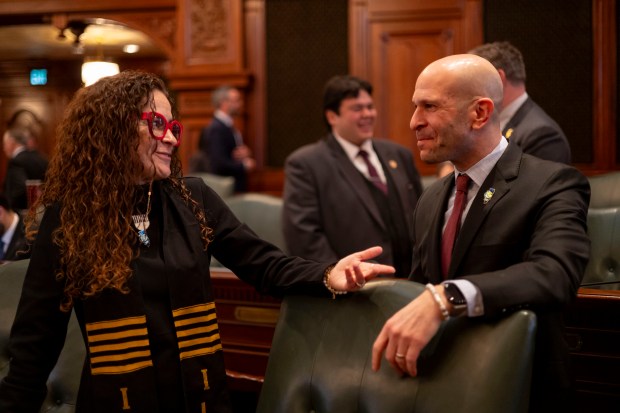Harvey Mayor Christopher Clark pledged Tuesday not to raise village property taxes in the 2025 fiscal year, coinciding his message with the day homeowners were to receive property tax bills for 2023 with historic increases.
Clark’s took the action after tax bills reflected a 30% increase or more in 15 south suburbs, 13 of which have mostly Black populations.
An analysis by the Cook County treasurer’s office showed median tax bills are rising by 19.9%, the largest jump in 29 years.
“You’re destroying poor and working poor people,” Clark said at a news conference. “And specifically, you’re destroying 13 of 15 Black communities here in the Southland.”
While Clark is pledging no tax increase from the city, Harvey residents total property taxes include levies from the county, school districts, townships and the park district.
Clark urged mayors from all south suburbs experiencing tax increases this week to sign his Hold the Tax Pledge, which aims to offer relief to residents within their tax districts.
“The 19 highest tax rates in Cook County are still in Chicago’s south suburbs, where the population is primarily lower income Black residents, demonstrating once again, the stark inequities in the Illinois property tax system,” Clark said. “But Harvey is a diverse city with Black, Hispanic, white, Middle Eastern and Asian residents and in our opinion, the tax increase knows no race, it breaks the back of everyone that it touches.”
More than 327,500 suburban homeowners who live south of North Avenue will see higher bills this year, according to the treasurer’s report. But some municipalities are seeing higher bills than others.
The treasurer’s analysis shows Harvey is one of seven communities with tax increases exceeding 20%, along with Ford Heights, Riverdale, Phoenix, Park Forest, Calumet City and Dolton.
The south suburbs went through their triennial reassessment last year, where homes and businesses were given new values by the Cook County assessor.
According to the treasurer’s report, businesses saw significantly less of a tax increase this year because their assessed values grew at a much slower pace than for homes. The report shows residential values across the Southland grew by 34.1%, while those for businesses grew 13.7%.
Clark said reassessments have shifted 4% of the tax burden from businesses to homeowners and emphasized his commitment to collect overdue commercial property taxes in Harvey.
“If they don’t pay their fair share, then the citizens of Harvey end up paying for them,” he said.
According to a city news release, Harvey is facing a $149 million deficit, which Clark said is exacerbated by 465 commercial properties that have accumulated overdue property taxes over 20 years.
Clark also attributed the city’s financial state to the previous administration’s mismanagement of bonds he said resulted in unpaid Police and Fire department pensions.
In an effort to collect the tax debt, the city passed an ordinance in January to deny operating licenses to businesses with overdue property taxes.
When license applications were due for renewal in April, some Harvey business owners with late taxes, who chose to continue operating, were presented with a settlement agreement allowing them to sidestep fines of up to $2,500 a day and stay open while they determine how to settle the debt.
The settlement allows for payments of $2,500 per month, two $12,000 installments for the year or a lump sum of $20,000 upfront.
Still, some business owners said they cannot afford to pay the settlement fees or settle their tax debt.
Clark said when he spoke with business owners prior to offering the settlement, many were paying their landlord with overdue taxes between $4,000 to $5,000 a month.
“Why can’t they pay the city of Harvey 2,500 dollars and when does it becomes the city of Harvey’s responsibility to subsidize their business?” Clark said.
Clark said many businesses are not owned by residents of the city, and therefore, many owners take advantage of city services without paying their taxes.
“I can’t find a resident in the city of Harvey who’s saying that they would rather pay a business’s taxes so that they can stay open making money,” he said.
Clark said his responsibility is to Harvey residents first, and not the business owners who avoid paying their due.
“If they can’t make $2,500 a month for their business, I don’t know, maybe they need to go back to school. Maybe they need to start thinking about another career choice. I don’t know. My responsibility is not to them. My responsibility is to the residents of the city of Harvey,” Clark said.
Clark said some business owners have chosen to work with the city to come up with a way to settle their tax debt, but the majority have been “encouraged by other forces not to work with the city.”
“In due time, we will continue to apply pressure on them and we will apply legal pressure on them to get them to comply,” Clark said.




